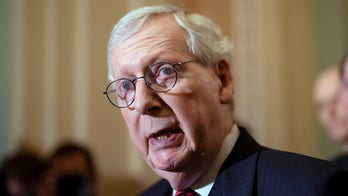The Democratic battering ram of daily procedural votes -- compounded with the Senate majority leader casting opponents of a banking overhaul as "un-American" -- seems to have taken its toll on weary Republicans, who agreed Wednesday to allow a bill to come to the floor and said they will try to change it there.
GOP senators had said earlier they don't want Americans to "get burned" again on a bill that senators haven't even read, but they acknowledged that the headlines have cast them as uncooperative. Not helping was Republican Sen. Bob Corker's acknowledgement that a GOP alternative doesn't really serve much purpose.
On Wednesday, Sen. Richard Shelby, the top Republican on the Senate Banking, Housing and Urban Affairs Committee, said he has assurances that Democrats will adjust the banking regulation bill to address concerns that it perpetuates bailouts.
Among the key points Republicans expect Democrats to address in the bill are:
-- Taxpayers must not be exposed.
-- The so-called bailout fund is removed.
-- Failing firms must be wound down and shareholders must be wiped out. A presumption is not enough.
The agreement got the bill to the Senate floor for debate Wednesday evening, but it does not bridge other significant differences between the parties on the bill.
"It's very difficult for me to comprehend senators, Republican senators, coming to the floor and nitpicking this bill," Sen. Harry Reid, D-Nev., said Wednesday before a third vote on the bill that Republicans say does too little to help Main Street.
"We don't say this bill is perfect, but we worked really hard to get it where it is," he said. "All the talk of the Republicans, about wanting to do something about this bill before it gets on the floor, is really anti-Senate, and anti-American."
Sen. Chris Dodd, D-Conn., the chairman of the banking panel, said it's time for debate to begin.
"For the last year and a half, I have worked with Senator Shelby as I crafted the bill to reform Wall Street. They have been productive talks, but I cannot agree to his desire to weaken consumer protections given the enormous abuses we have seen.”
In an effort to cast Republicans as obstructionist, the Democratic National Committee released a television ad, titled "Risky Business," criticizing Republicans for their votes against starting debate on the financial bill.
But Senate Minority Leader Mitch McConnell said the three days of procedural votes that held up debate were worthwhile.
"The time afforded by my Republican colleagues and Sen. Ben Nelson was instrumental in gaining assurances from the chairman that changes will be made to end taxpayer bailouts and the dangerous notion that certain financial institutions are too big to fail," he said.




